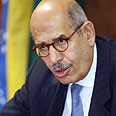
IAEA: Iran more open on atom work, bomb fears remain
UN nuclear watchdog says Tehran has revealed some nuclear advances earlier off-limits to UN Inspectors, but a failure to clarify explosives and missile work relevant to atom bombs is a 'serious concern'. Six powers to meet on Iran next week, diplomat says
Iran has revealed some nuclear advances earlier off-limits to UN Inspectors, but a failure to clarify explosives and missile work relevant to atom bombs is a "serious concern", the International Atomic Energy Agency said.
In a report on Friday the IAEA said Iran was being more open with monitors than before, but added that Iran was testing technology that could give it the means to enrich uranium much faster.
The Iranian moves were further defiance of international demands that Tehran halt all sensitive nuclear activity or be hit with broader UN sanctions.
The IAEA findings, which also said Iran had failed to clear up all outstanding questions by an agreed February deadline, may be branded negative on balance by big powers and spur the UN Security Council to adopt more sanctions as early as next week.
The report said Iran was avoiding meaningful responses to intelligence pointing to covert efforts, under military auspices, to "weaponise" nuclear work by linking uranium processing, high explosives tests and missile warhead design.
Such activities were applicable to atomic warheads, it said.
"The (weaponisation) studies are a matter of serious concern and critical to an assessment of a possible military dimension to Iran's nuclear program," said the confidential report, issued by IAEA chief Mohamed ElBaradei and obtained by Reuters.
"The agency will not be in a position to make progress towards providing credible assurances about the absence of undeclared nuclear material and activities in Iran before reaching some clarity on the nature of the alleged (weaponisation) studies, and without implementation of the additional protocol" on wide-ranging, snap inspections.
Without that, it said, there could be "no confidence in the exclusively peaceful nature of the program".
Senior diplomats from Britain, France, Germany, the United States, China and Russia will meet in Washington on Monday to discuss next steps regarding Iran's nuclear program, a Western diplomat said Friday following the release of the IAEA report.
On Thursday, France and Britain formally submitted a third sanctions resolution against Iran to the UN Security Council, which they hope will be voted on next week.
Iran: IAEA report shows atom work peaceful
Iran's chief nuclear negotiator said Friday that the UN nuclear watchdog report showed Tehran's activities were peaceful was a victory for the Islamic republic.
Saeed Jalili said the IAEA report "is another document which proves the Iranian nation was
right about the nature" of its nuclear program.
"This report showed that our activities are peaceful," he told a news conference in Tehran shortly after the IAEA report was released in Vienna.
"I congratulate the Iranian nation for this success and victory which was a result of their resistance on (the country's) nuclear rights," Jalili said.
A senior Iranian lawmaker, Alaeddin Boroujerdi, described the agency's report as "positive" and said it would undermine a US push for more UN sanctions, IRNA news agency reported.
"The road will not be paved for the Americans to issue a new resolution against Iran in the (UN) Security Council," Boroujerdi, the head of the Iranian parliament's national security and foreign policy commission, was quoted as saying.
Iranian President Mahmoud Ahmadinejad earlier said Iran would not halt uranium enrichment, which can produce fuel for nuclear power plants or atomic weapons.
"Today the Iranian nation stands firm ... and will not allow anyone to infringe on its rights even a small bit," He was quoted as saying by IRNA news agency late on Thursday.
Iran has said it has satisfactorily answered all relevant IAEA questions about past activities, its nuclear slate is now clean and sanctions are unjustified and illegal.
'Diminishing knowledge'
Tehran says it aims to refine uranium only to the low level needed for power plant fuel so it can export more oil wealth.
ElBaradei last year spoke of "diminishing knowledge" about Iran's advancing program since it stopped observing the Additional Protocol in protest at sanctions steps.
Iran has lifted the veil somewhat since November by granting broader, if limited and one-off, access to inspectors, the new report said – a possible effort to forestall further sanctions.
It said Iran had given ElBaradei and other agency officials a long-sought look at work to launch a more durable centrifuge meant to overcome technical glitches hindering production of usable quantities of nuclear fuel by Tehran.
The report confirmed Iran was testing "IR-2" centrifuges, an upgrade of a design obtained from Pakistani-led nuclear smugglers, by feeding them with uranium gas in the pilot wing of its Natanz nuclear complex.
It said 12 IR-2s were being tested, 10 of them in an interlinked cascade. The report did not say when Iran would start installing large numbers in Natanz's main production hall to replace 3,000 older, unreliable "P-1" centrifuges now running. IR-2s can enrich 2-3 times faster than P-1s.
A senior IAEA official said the 3,000 P-1s installed last year as a basis for industrial-scale enrichment were performing poorly, at very low capacity, possibly hastening a shift towards superior IR-2s.
The IAEA report said Iran had provided enough information for it to defuse proliferation concerns and close inquiries into five other past issues, including traces of high enriched -- possibly bomb grade -- uranium found on lab equipment.
Iran said the particles came with used equipment imported from Pakistan.
But IAEA decisions to wrap up some points of the inquiry, including on the HEU particles, hinged on answers classified as plausible but which could not be entirely verified, Western diplomats said.
This could raise Western concerns about files being closed prematurely and prompt calls at a March 3-7 meeting of the IAEA's 35-nation board of governors for more information before endorsing the results of the "work plan", they said.















